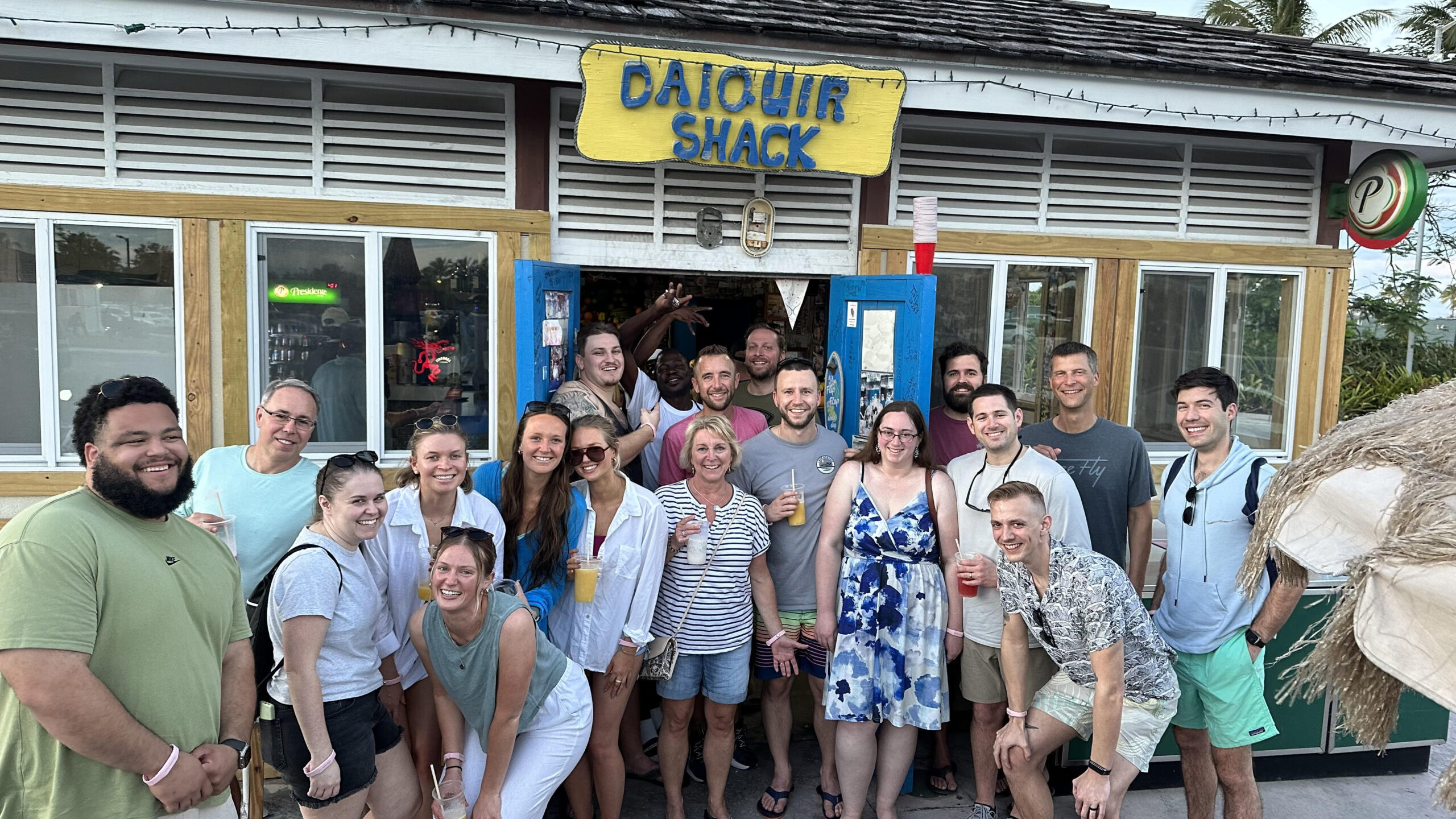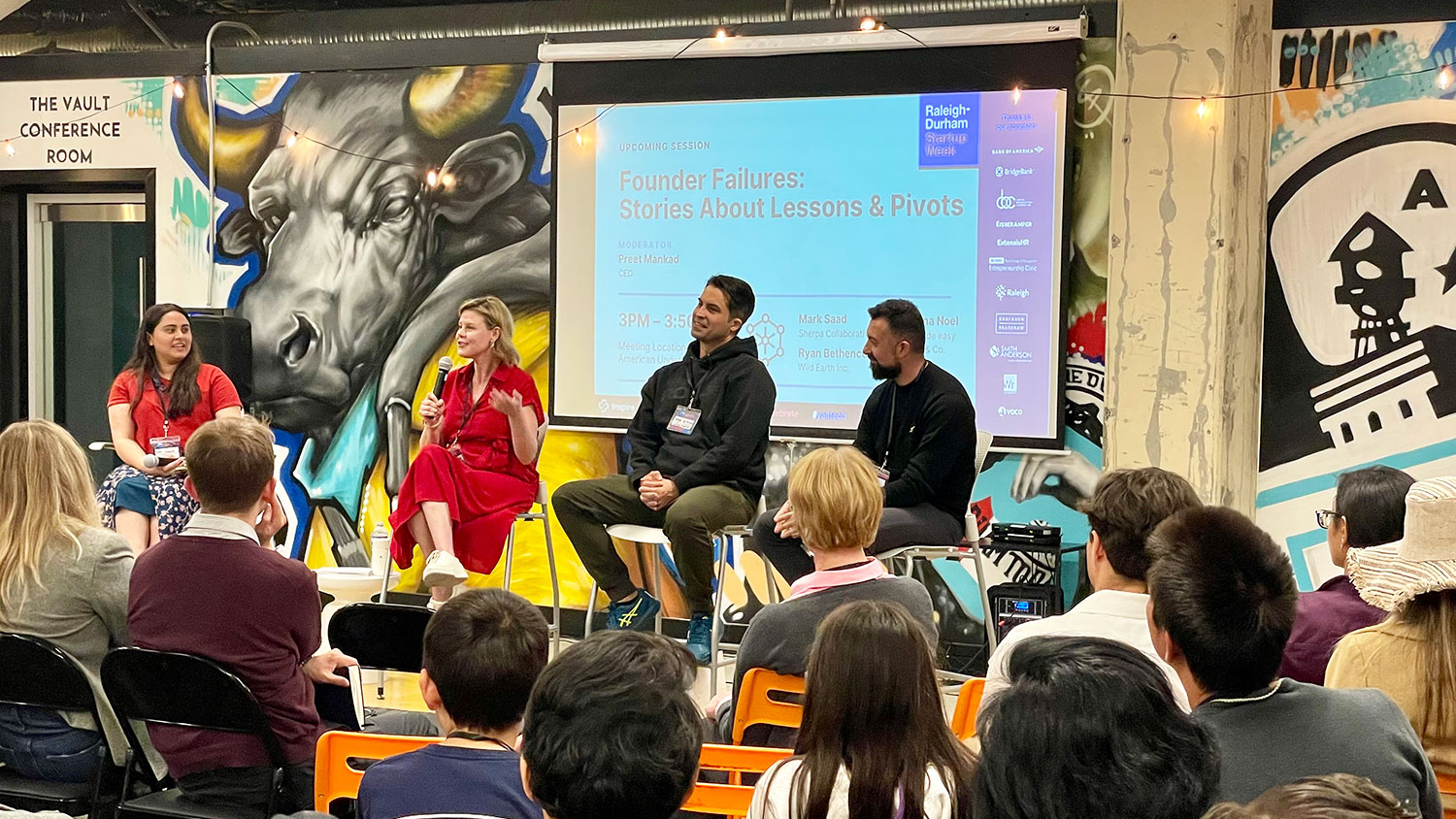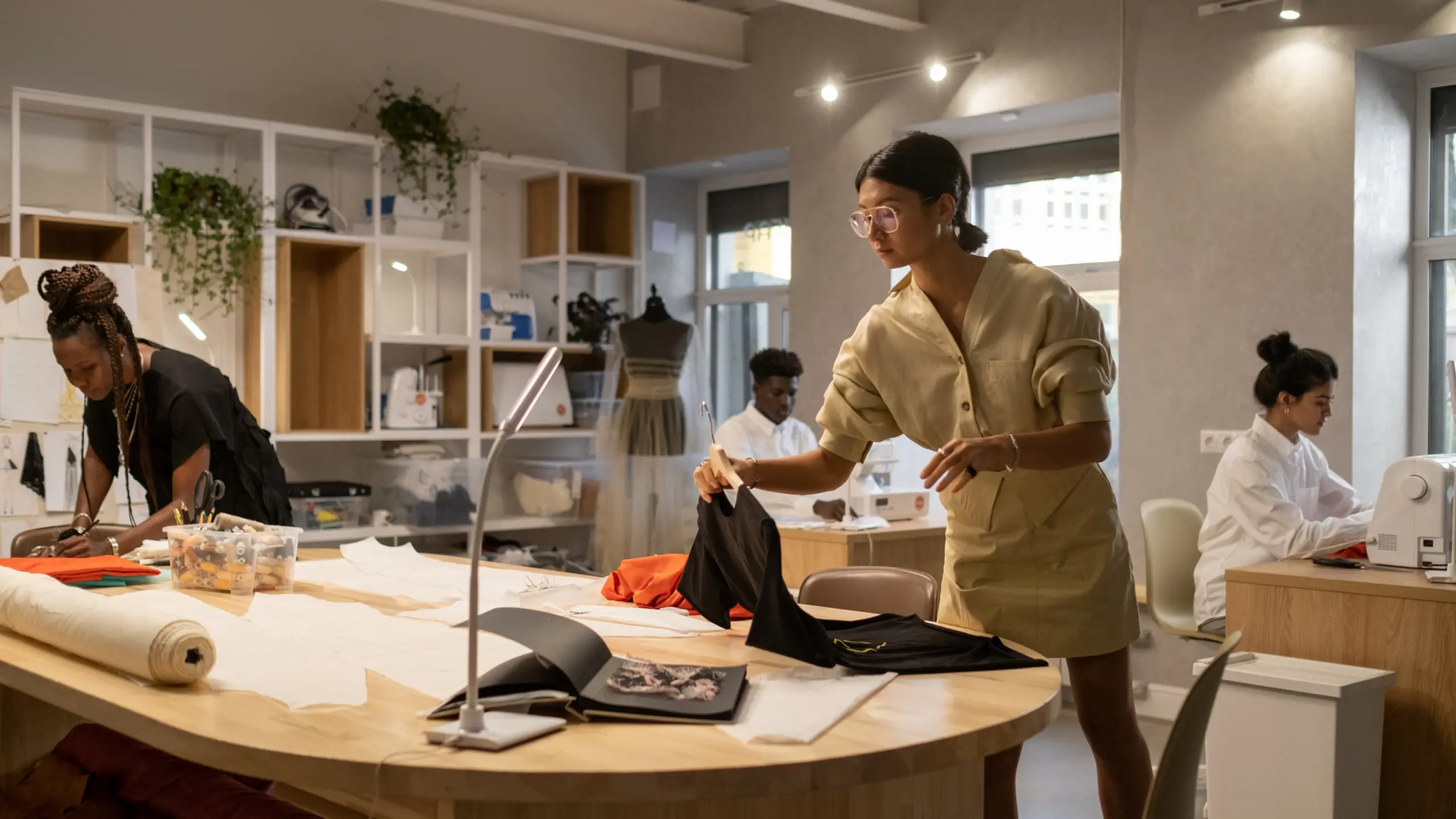Cross-Disciplinary Students Excel in Social Innovation
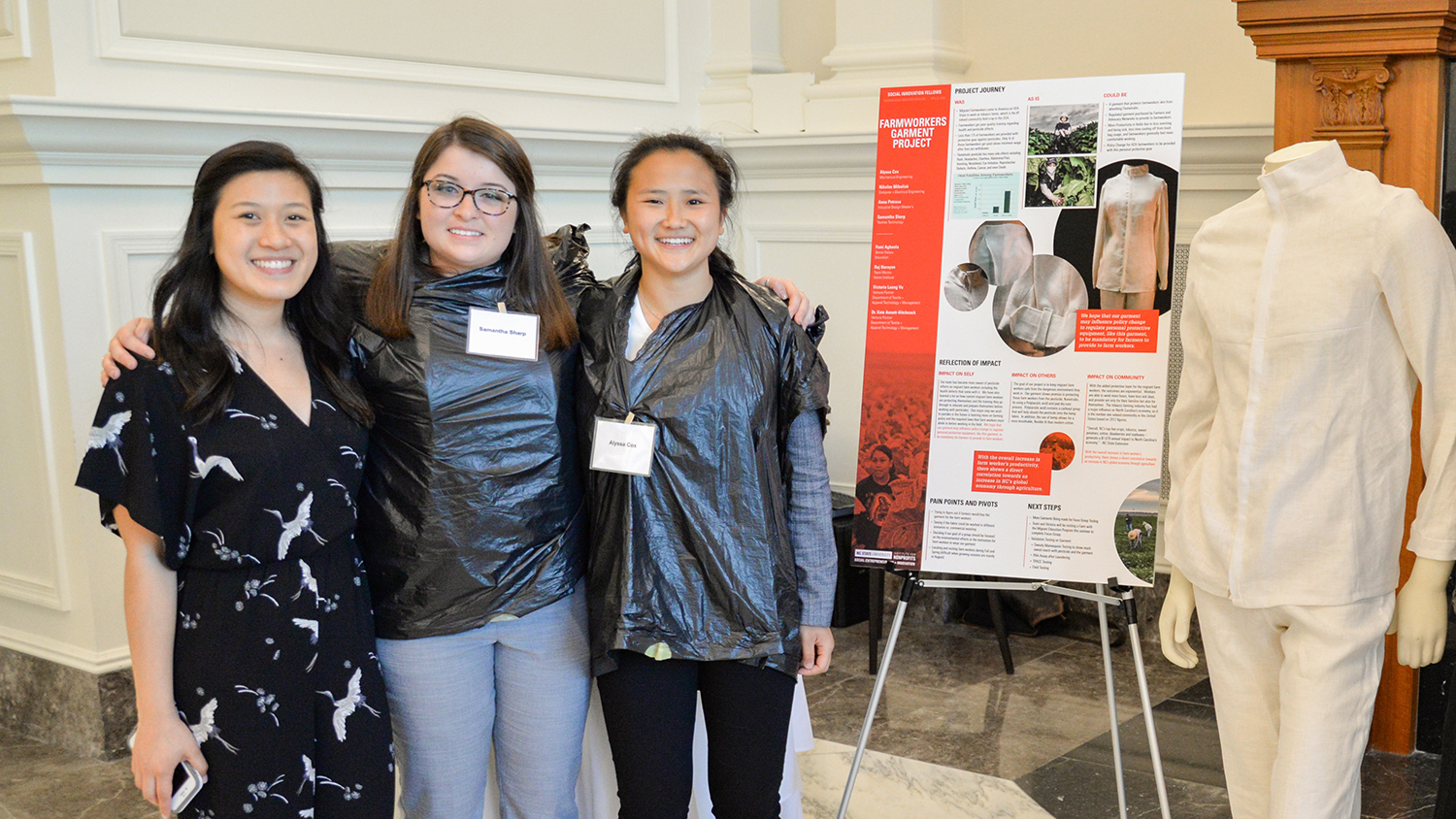
Imagine. The word echoed countless times through the Great Reception Room of the Dorothy and Roy Park Alumni Center on Monday, April 22 as the Social Innovation Fellows closed out the spring semester with presentations on their year-long projects. While they begged the audience to imagine life as rural North Carolina farmworkers suffering in the summer heat or Rwandan workers emptying a pit latrine, the Social Innovation Fellows proposed solutions that proved they do more than imagine: they think and do.[spotlight-box img=”21260″ heading=”2019 Award Winners” url=””]Congratulations to the Farmworkers Garment Project team for winning the $3,000 Eastman Social Innovation Showcase audience choice award. [/spotlight-box]
The Social Innovation Fellows program, an offering by the Institute for Nonprofits, pairs student teams with social entrepreneurs to discover, design and do good by creating impactful solutions to local and global challenges. The 2018-2019 cohort was comprised of 26 students, freshman through graduate level, from a wide range of disciplines. On April 22, the students presented their work at the Eastman Social Innovation Showcase, pitching for a $3,000 award sponsored by the Eastman Innovation Center. Read more below about the problems tackled and solutions developed by the Social Innovation Fellows during the 2018-2019 academic year.
Sandhills Farmers’ Initiative Team
Alysa Buchanan, College of Design | Sierra Jones, Poole College of Management | Craig Prince, College of Engineering | Laura Schoeck, College of Natural Resources | Sofia Abdo, Poole College of Management | Ruth Kintzele, College of Humanities and Social Sciences
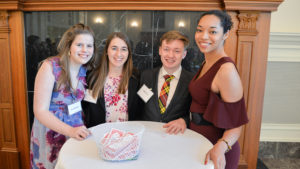
The Sandhills Farmers’ Initiative team(SFIT) has a focus of connecting local farmers to local families. The group chose the Sandhills community in rural North Carolina as the focal point of their efforts as they explored why farmers are losing money and how they can connect them to resources that boost the local economy. SFIT has partnered with two companies, Vacation Vittles and Freshspire, to achieve their goals. Vacation Vittles allows vacationers to buy produce boxes while Freshspire is an online produce marketplace where farmers and buyers can build lasting relationships. Over the spring semester, the students ran a marketing campaign that brought clients and farmers together through these two enterprises. Learn more.
Farmworkers Garment Project Team
Alyssa Cox, College of Engineering | Nikolas Mihaliak, College of Engineering | Anna Petrova, College of Design | Samantha Sharp, College of Textiles | Fumi Agboola, College of Education
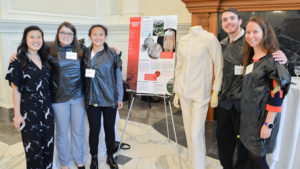 The Farmworkers Garment team explored the problem of improper or un-protective apparel for farmworkers dealing with tobacco. Less than 20% of farmworkers on tobacco farms in the US are provided the correct protective gear while the number one pesticide used on tobacco is so toxic it has been banned in the European Union. The students developed protective garments made of a fabric that absorbs pesticide and keeps it from touching the skin. The garments are a much lighter weight alternative to the black trash bags many farmworkers wear to protect themselves from the harmful chemicals. So far, the group has been selected to share their solution at the 2019 Farmworkers Institute in Chapel Hill and in summer 2019, they will take their garment to stakeholders for customer validation as they continue to perfect the prototype. Learn more.
The Farmworkers Garment team explored the problem of improper or un-protective apparel for farmworkers dealing with tobacco. Less than 20% of farmworkers on tobacco farms in the US are provided the correct protective gear while the number one pesticide used on tobacco is so toxic it has been banned in the European Union. The students developed protective garments made of a fabric that absorbs pesticide and keeps it from touching the skin. The garments are a much lighter weight alternative to the black trash bags many farmworkers wear to protect themselves from the harmful chemicals. So far, the group has been selected to share their solution at the 2019 Farmworkers Institute in Chapel Hill and in summer 2019, they will take their garment to stakeholders for customer validation as they continue to perfect the prototype. Learn more.
Haiti Goat Project Team
Jordan Bowman, Poole College of Management | Nimet Degirmencioglu, College of Textiles | Marcie Laird, College of Design | Paige Swanson, College of Agriculture and Life Sciences | Anirudh Akula, College of Engineering
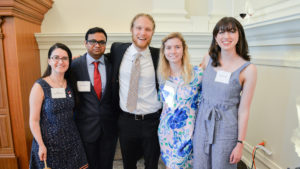 In Haiti, one in four children are malnourished, specifically lacking Vitamin A, iron and protein. Over the course of the 2018-2019 school year, Social Innovation Fellows worked with the Haiti Goat Project as they provided high-nutrition meals to over 675 children at three schools in Haiti. During the year, the students engaged donors to raise $6,370 that will help the organization expand the program to children at a fourth school. Social Innovation Fellow Jordan Bowman’s closing words rang out, “there’s no such thing as other people’s children—help us help the children of Haiti. Thank you.” Learn more.
In Haiti, one in four children are malnourished, specifically lacking Vitamin A, iron and protein. Over the course of the 2018-2019 school year, Social Innovation Fellows worked with the Haiti Goat Project as they provided high-nutrition meals to over 675 children at three schools in Haiti. During the year, the students engaged donors to raise $6,370 that will help the organization expand the program to children at a fourth school. Social Innovation Fellow Jordan Bowman’s closing words rang out, “there’s no such thing as other people’s children—help us help the children of Haiti. Thank you.” Learn more.
Root Bioscience Team
Catherine Chirichillo, College of Engineering | Trent Haire, College of Textiles | Rebecca Popov, College of Humanities and Social Sciences | Haley Pratt, College of Veterinary Medicine | Gracie Hornsby, College of Engineering
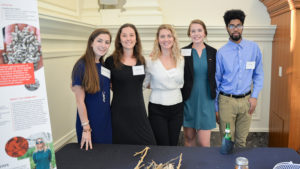 The Root Bioscience team chose to address the growing waste management issue in the hemp industry. Cannabidiol (CBD) revenue is projected to double in the next several years and the production process lacks a waste management system that protects and benefits the environment. In response, the Root Bioscience team introduced the first cat litter made of hemp: Cannacat Litter. Entire mountainsides are removed to create most of the cat litter on the market currently and this solution effectively reduces hemp waste and mountaintop removal. The team’s product is of equal or greater quality than the ones on the market making it a competitive alternative, but the journey doesn’t end with the solution. The team is seeking partnerships with organizations who can help analyze costs and position them to enter the industry at a competitive price. Learn more.
The Root Bioscience team chose to address the growing waste management issue in the hemp industry. Cannabidiol (CBD) revenue is projected to double in the next several years and the production process lacks a waste management system that protects and benefits the environment. In response, the Root Bioscience team introduced the first cat litter made of hemp: Cannacat Litter. Entire mountainsides are removed to create most of the cat litter on the market currently and this solution effectively reduces hemp waste and mountaintop removal. The team’s product is of equal or greater quality than the ones on the market making it a competitive alternative, but the journey doesn’t end with the solution. The team is seeking partnerships with organizations who can help analyze costs and position them to enter the industry at a competitive price. Learn more.
Flexcrevator Team
Daniel Choi, College of Natural Resources | Raunak Mahtani, College of Design | Allison Williams, College of Engineering | Mohit Kamat, College of Design | Ben Saia, College of Engineering
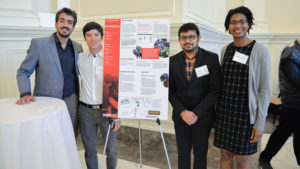 For 1.77 billion people across the globe, waste does not magically disappear at the flush of a toilet. A percentage of the world’s population still use pit latrines that must be emptied by hand and so many of the workers emptying latrines have no protective equipment. A solution exists—over the past few years engineers at NC State have been creating a system for emptying sewage from pit latrines that provides efficiency for companies and dignity for workers. However, the biggest challenge is the disconnect between people experiencing the problem and the people with the solution. This Social Innovation Fellows team has created a marketing plan divided into five stages to help connect the problem and the solution. They intend to focus first on a community in Rwanda where they have local connections—this will help validate the product before the Flexcrevator team attempts to commercialize the product on a larger scale. Learn more.
For 1.77 billion people across the globe, waste does not magically disappear at the flush of a toilet. A percentage of the world’s population still use pit latrines that must be emptied by hand and so many of the workers emptying latrines have no protective equipment. A solution exists—over the past few years engineers at NC State have been creating a system for emptying sewage from pit latrines that provides efficiency for companies and dignity for workers. However, the biggest challenge is the disconnect between people experiencing the problem and the people with the solution. This Social Innovation Fellows team has created a marketing plan divided into five stages to help connect the problem and the solution. They intend to focus first on a community in Rwanda where they have local connections—this will help validate the product before the Flexcrevator team attempts to commercialize the product on a larger scale. Learn more.
To learn more about the Social Innovation Fellows program and how you can apply or get involved as a mentor, see the website or reach out to Alisha Brice at ambrice@ncsu.edu.
